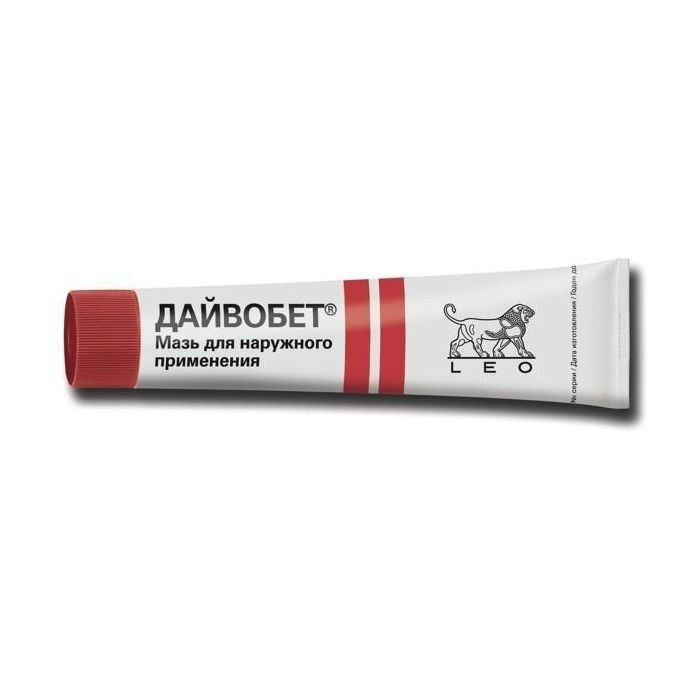betamethasone, Kaltsypotryol | Dayvobet ointment, 15 g
Special Price
$36.26
Regular Price
$44.00
In stock
SKU
BID463229
Release form
Ointment for external use.
Pharmacological action
Pharmacodynamics
Calcipotriol is a synthetic analogue of the active metabolite of vitamin D. It inhibits the proliferation of keratinocytes and accelerates their morphological differentiation.
Betamethasone is a lucocorticosteroid (GCS) for external use. It has a local anti-inflammatory, antipruritic, vasoconstrictive and immunosuppressive effect, however, the exact mechanisms of the anti-inflammatory effect of topical corticosteroids are not completely clear. The use of occlusive dressings enhances the effect of topical corticosteroids, as this increases their penetration into the skin itself.
Pharmacokinetics
Absorption and distribution of
When using Daivobet, the absorption of calcipotriol and betamethasone through intact skin is less than 1%. When applying the drug to psoriatic plaques and under occlusive dressings, the absorption of topical corticosteroids increases. Since a depot of the drug is created in the skin, its elimination from the skin occurs within a few days.
Metabolism and excretion
Betamethasone is metabolized in the liver and kidneys to form glucuronides and sulfoesters, excreted through the intestines and kidneys.
Indications
Chronic vulgar plaque psoriasis.
Contraindications
Disease, accompanied by impaired calcium metabolism
severe renal and hepatic insufficiency
viral infections (including herpes or chickenpox) infections
fungal infections of the skin
bacterial infections of the skin
parasitic infections of the skin
rosacea srdlkrdclergis dermatosis srdlkrdkrul dermatosis skin atrophy
skin ulcers
increased fragility of skin vessels
ichthyosis
perianal and genital itching
psoriatic erythroderma
teardrop, exf olivative, pustular psoriasis
hypersensitivity to the drug.
Use during pregnancy and lactation
The safety of Daivobet during pregnancy and lactation has not been established, so the use of the drug is possible only when, according to the doctor, therapy with its use is necessary.
Composition of
1 g of ointment for external use contains:
Active substances: betamethasone dipropionate 643 μg, equivalent to 500 μg betamethasone calcipotriol monohydrate 52 μg, equivalent to calcipotriol 50 μg.
Excipients: liquid paraffin, polyoxypropylene-15-stearyl ether,? -tocopherol, soft white paraffin.
Dosage and administration
Adults: ointment is applied externally with a thin layer to the affected skin 1 time / day.
The maximum daily dose is not more than 15 g, the maximum weekly dose should not exceed 100 g. The recommended duration of treatment is 4 weeks. It is possible to conduct repeated courses of treatment under the supervision of a doctor.
The area of application of the drug should not exceed 30% of the surface of the body.
Side effects
Side effects are classified by frequency of occurrence: most common> 1/10.
frequent> 1/100 and <1/10.
infrequent> 1/1000 and <1/100.
rare> 1/10 000 and <1/1000.
very rare <1/10 000.
From the skin and appendages of the skin: frequent - itching, rash, burning sensation infrequent - pain, irritation, dermatitis, erythema, exacerbation of psoriasis, pigmentation disturbance at the site of application of the ointment, rare folliculitis - pustular psoriasis. Calcipotriol can cause local skin irritation, itching, burning, acute pain, dry skin, erythema, rash, dermatitis, eczema and exacerbation of psoriasis. The prolonged topical use of betamethasone (dipropionate) is associated with the development of skin atrophy, telangiectasias, striae, folliculitis, hypertrichosis, perioral dermatitis, allergic contact dermatitis, depigmentation, colloid skin degeneration, as well as an increased risk of generalized pustular psoriasis, hyper- and photo-reaction including extremely rare cases of angioedema and facial edema.
Systemic reactions: when using calcipotriol, a very rare side effect is hypercalcemia or hypercalciuria. Topical use of betamethasone is associated (rare, but sometimes severe, especially with prolonged use, on large surfaces and when using occlusive dressings): suppression of adrenal cortex function, cataracts, infections, increased intraocular pressure.
Adverse events such as suppression of the hypothalamic-pituitary-adrenal system with the development of reversible secondary adrenal insufficiency or exacerbation of diabetes mellitus associated with the systemic administration of GCS can also be observed with prolonged use of topical GCS due to systemic absorption.
Drug Interaction
The drug interaction of the drug Dibobet has not been described to date.
Overdose
Symptoms: Increased blood calcium, suppression of function of the pituitary-adrenal system with the development of reversible secondary adrenal insufficiency.
Treatment: withdrawal of the drug, if necessary, conduct symptomatic therapy. In cases of chronic toxicity, ACS should be discontinued gradually.
Storage conditions
Store at a temperature not exceeding 25 РC.
Keep out of the reach of children.
Expiration
2 years. After the first autopsy, the Expiration is 3 months.
Dosage form
Dosage form
ointment
Write Your Own Review

